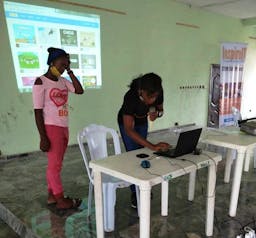The Day I Understood Social Isolation
Apr 30, 2019
Story
August is usually the month when married women from my community gathered to discuss issues affecting the growth and development of their community. The meeting popularly known as “August Meeting” is one that every woman in the community look forward to every year. August meeting which has become quite popular in Igbo land was originally geared towards rural community development but in recent times, it has also delved into conflict management, peace building and human development.
Growing up, I saw and heard most women from my community talk about August Meeting excitedly. It is an opportunity for women to interact and know one another. During the meeting, the women wear uniforms and there were fines for latecomers and absentees. Also, women based abroad traveled down home to make decisions with the women based in the village on issues affecting the development of the community.
For me, it was and is still refreshing to see that women are ready to celebrate their own achievements and act as catalysts for rural development irrespective of the traditions that put them behind men. In Igbo land, women are excluded from succession and eligibility to inherit the property of their father. However, a Supreme Court Decision made on April 14th 2014 made women succession and eligibility of property valid. I saw a lot of women in my village being accused of killing their husbands by their fellow women while these same women would find it difficult to point accusing fingers at the men who lost their wives. Many women find it difficult to speak out against evil practices and customs, and I think many women are too scared and bound by culture.
An incident during one of their meetings had an impact on me.
While in the house sleeping, I could hear very loud voices; thinking it was the women, I did not bother. After few minutes, the voices became even louder that I had to rush outside to check. When I came out, I saw three women shouting at another woman in Igbo dialect, the three women looked angry while the woman being shouted at looked a bit surprised and sad. The women were at a corner, not too far from the meeting venue. I was not happy seeing that none of the women at the meeting was calling them to order.
“Old witch, this is why no man wants to marry you!”
“You should not even talk when women are talking!”
“How dare you challenge us in this meeting, are you even married?”
I looked at the woman being shouted at, her eyes were misty and it was obvious that if she stayed any longer at that meeting, she was going to cry. It was obvious; the words were getting to her. Ignoring the women, she slowly stood up from her seat and left the meeting.
Some of the villagers call her Daa Rita but I fondly called her Daa Riri. Daa was a form of title used for addressing older women in my village. Daa Riri was in her late fifties and unmarried. She was an only child and one of the few women in the village who had no child. She was uneducated, unemployed and depended on friends and relatives for survival. Many villagers show their disdain for her because she is unmarried. Her means of survival when friends and relatives refuse to give her money or had no money to give her was farming on a piece of land at the back of her family compound. After watching her closely that day as she walked away from the meeting, I made up my mind to visit her and find out more about her. Most of the things I heard about her were not from her; it was from the villagers, many of whom clearly had nothing good to say about her.
The next day, I strolled down to Daa Riri’s family house, a small mud house. She rarely gets visitors, so as soon as she saw me, she went inside her house and brought out a bench. We both sat down and I pleaded with her to tell me her story. For over three hours, we talked. Sometimes we both laughed and other times, our eyes seem to do the talking. After our discussions that day, I really understood what it meant to be socially isolated, having listened to her and watched how the villagers ‘treated’ her. I asked her if she was willing to learn a skill like hairdressing or at least even learn how to use a computer. She replied in the affirmative. The journey to teach Daa Riri how to use a computer and the internet began after that visit. For the first three weeks, she was reluctant to learn but with encouragement and more practical sessions, she began to pick up in the fourth week. It took her eight months to learn how to use a computer and the internet.
After her training, Daa Riri started looking for a job. Unable to get a job after two months, she started her own computer training center through donations from friends who were willing to rent a place in the village square for her. Within six months, Daa Riri was able to train twenty women from neigbouring villages. I can clearly see how outspoken she has become and how some of the villagers marvel at her new level of confidence. Daa Riri is currently renovating her family mud house with the money she makes from training.
Despite the insults, challenges and obstacles, Daa Riri has redefined the saying that “It is never too late to start.” I hope that one day, the practice of “treating” unmarried women with contempt in our society will stop.




